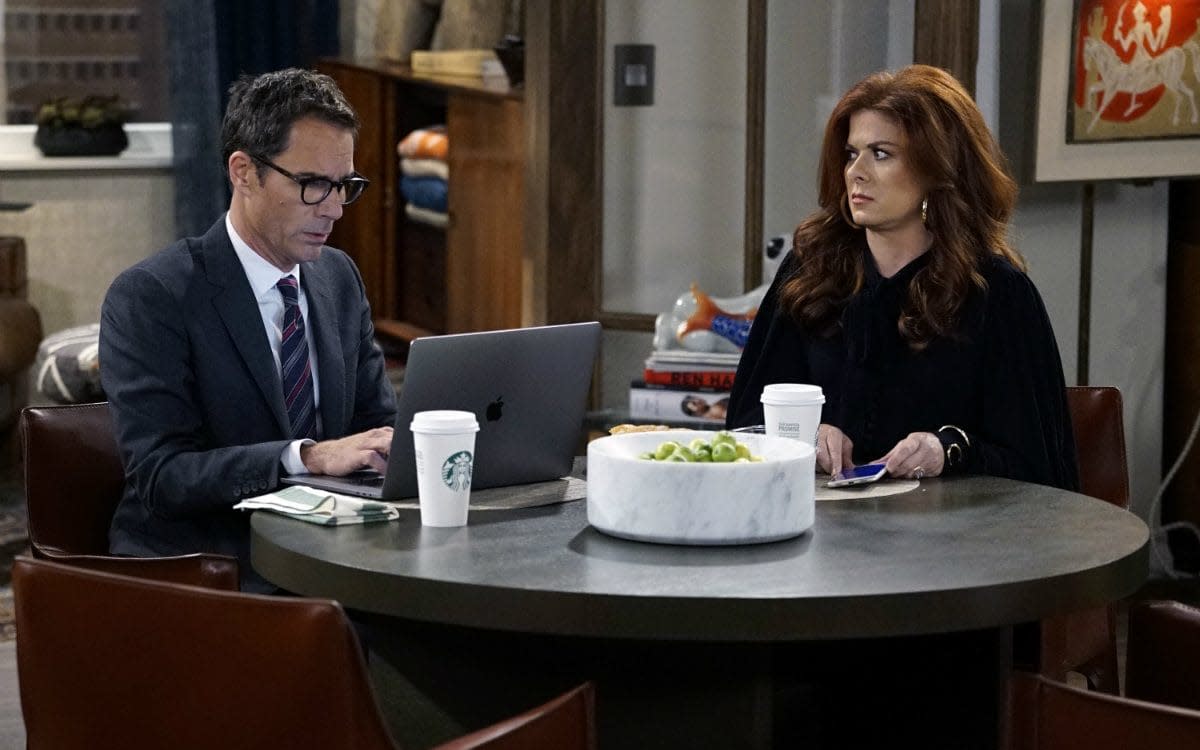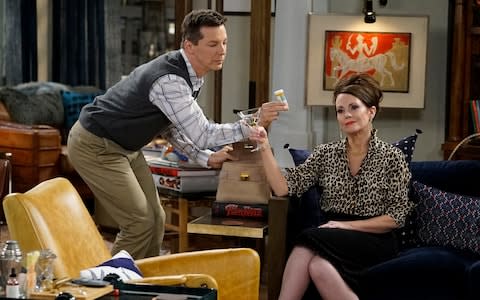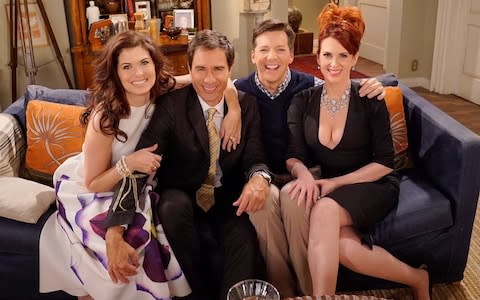Will & Grace review: the chemistry's still fresh, but the comedy is stale

When Will & Grace debuted in 1998, the worlds - the TV one and the real one - were different places. America's NBC network had 18 sitcoms on its weekly schedule, the most popular of which (Seinfeld, Friends, Frasier) aired on the fabled Thursday night Must-See-TV programming block, and attracted audiences upwards of 20 million. With the addition of Will & Grace to Must-See-TV, gay representation on network television moved beyond the sensitive saints and sexless jesters of the previous decades.
In 2017, the TV landscape is largely shaped by the sensibilities of gay show runners like Ryan Murphy and Greg Berlanti, and the degree of small screen gay representation has altered to the extent that promotional material for the upcoming reboot of Dynasty centres on its scheming, promiscuous, bitchy gay male cast members. The change in attitudes determining what is acceptable in the still-censorious world of American network television can in no small part be attributable to the success and ubiquity of Will & Grace which in its revived form now joins the three, lowly-rated, sitcoms currently airing on NBC.
Another Thursday night NBC comedy, the U.S adaptation of The Office, also had a significant affect on American TV comedy. Before The Office, prime-time sitcoms were populated by actors delivering big, theatrical performances in front of studio audiences encouraged to express their vocal appreciation at every punchline, double-entendre, pratfall and spit-take.
Will & Grace was a product of that unsubtle, but beloved, tradition. Its star quartet - Eric McCormack and Debra Messing as the titular BFFs, Sean Hayes and Megan Mullally as the scene stealing second bananas who swiftly ascended to equal billing - possessed such impeccable Swiss-watch timing that they were able to elevate even the hokiest material. For the entirety of its original eight-season run, guest-starring in Will & Grace, preferably as one of Will or Grace’s doomed love interests was a badge of honor that attracted the likes of Britney Spears, Madonna, Matt Damon, Cher, Michael Douglas and, as the head of the gay mafia, Elton John.
So how does the 2017 version of Will & Grace, a beneficiary of the current revive-anything-with-a-potential-built-in-audience era adapt to a post-Office environment? It doesn’t. This is a broad, blowsy old-fashioned show. But it’s also one that’s working hard to appear relevant. In the first five seconds, there are winking references to Caitlyn Jenner and Melania Trump.

Sean Hayes’ Jack attempts a Grindr joke (“I feel like I could get finger-herpes just from scrolling”), and Debra Messing makes a pussy hat gag and does two spit-takes. The characters are also quick to erase any lingering memories of the series’ melodramatic finale, in which, after years of estrangement, Will and Grace reunited and their respective children married each other. (“I had the weirdest dream,” squeaks Mullally’s Karen.)
There are intimations that the revived sitcom, already green-lit for a second season, will offer a more measured, downbeat look at the lives of these characters who are still unattached and unfulfilled in late middle age(very late in the case of Mullally’s possibly immortal Karen). But this first episode is entirely bereft of depth or character development.
The curse of a long-running sitcom is that deep into its existence, the writers are entirely bereft of ideas and go insane. That’s why the last season of Mindy Kaling’s series had a Groundhog Day episode and a show where she dreamed she was a white man for a day. But that’s a show on its last legs. This very first episode of the revived Will & Grace contrived a way for all four principals to be at the White House.

Will was there to meet and flirt with a Congressman. Jack was there to hook up with a Secret Service agent and Karen recommended Melania Trump hire Grace to redecorate the Oval Office (“Melania says, Is she pretty? And I says, Not a threat”). Grace’s most significant addition to the decor: a red cap bearing the statement Make America Gay Again.
Messing, McCormack, Mullally and Hayes have all worked steadily since the show originally went off the air. There’s no sense of desperation behind this resurrection. Their chemistry is evident and their collective timing is still a wonder. But as soon as the plot mechanics deposited them in the White House, the show felt feeble and decrepit.
If you’re an American comedy in 2017 with ambitions to take on the current administration, you’re automatically at the tail-end of a very, very long and angry queue. You should spend your time sharpening your claws and your teeth for the kill. In this episode, Will & Grace did the exact opposite. A toothless start doesn’t immediately doom the entire comeback. And anyway, the majority of the audience will be tuning in because of their affection for the characters. If you thought they were adorbs then, you’ll think they’re adorbs now.
The best TV shows of 2017